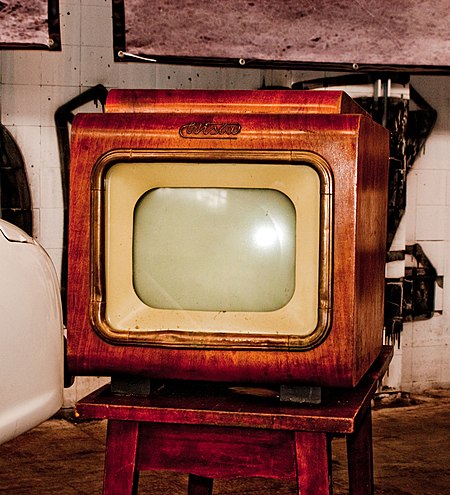Portal:Television
The Television Portal

Television (TV) is a telecommunication medium for transmitting moving images and sound. Additionally, the term can refer to a physical television set, rather than the medium of transmission. Television is a mass medium for advertising, entertainment, news, and sports. The medium is capable of more than "radio broadcasting", which refers to an audio signal sent to radio receivers.
Television became available in crude experimental forms in the 1920s, but only after several years of further development was the new technology marketed to consumers. After World War II, an improved form of black-and-white television broadcasting became popular in the United Kingdom and the United States, and television sets became commonplace in homes, businesses, and institutions. During the 1950s, television was the primary medium for influencing public opinion. In the mid-1960s, color broadcasting was introduced in the U.S. and most other developed countries.
In 2013, 79% of the world's households owned a television set. The replacement of earlier cathode-ray tube (CRT) screen displays with compact, energy-efficient, flat-panel alternative technologies such as LCDs (both fluorescent-backlit and LED), OLED displays, and plasma displays was a hardware revolution that began with computer monitors in the late 1990s. Most television sets sold in the 2000s were flat-panel, mainly LEDs. Major manufacturers announced the discontinuation of CRT, Digital Light Processing (DLP), plasma, and even fluorescent-backlit LCDs by the mid-2010s. LEDs are being gradually replaced by OLEDs. Also, major manufacturers have started increasingly producing smart TVs in the mid-2010s. Smart TVs with integrated Internet and Web 2.0 functions became the dominant form of television by the late 2010s. (Full article...)
Selected article -
Selected image -

CRT TV set "Wisła" ("Vistula") made in Poland, since 1955, by Warszawskie Zakłady Telewizyjne
Did you know (auto-generated) -

- ... that as general director of the Grand Theatre in Łódź, bass singer Kazimierz Kowalski led a worldwide television broadcast of Moniuszko's The Haunted Manor?
- ... that country music singer Waylon Jennings earned his GED by watching tapes of a Kentucky Educational Television series on his tour bus?
- ... that the exclusive secret society Hamilton House from the television show Gossip Girl was based on St. Anthony Hall, a social and literary fraternity?
- ... that Ruslana Pysanka, who hosted a Ukrainian television program with Volodymyr Zelenskyy, died as a refugee in Germany?
- ... that Paul Dini was a writer for both the animated television series Batman: The Animated Series and the video game series Batman: Arkham?
- ... that Laura Robinson invented Canada's best-selling board game before becoming a successful actress and television producer?
Selected quote -
More did you know
- ...that copies of the 1982 biopic Will: G. Gordon Liddy, about a Watergate co-conspirator, are stored in the Nixon Presidential Materials collection at the U.S. National Archives?
- ...that The O.C.'s music supervisor Alexandra Patsavas worked in the music department of over fifty Roger Corman B-movies before her television debut?
- ...that actress, writer and producer Michelle Paradise created the television series Exes and Ohs without an agent?
- ...that Tomorrow's Pioneers, a television program for children produced by Hamas, features a mascot similar to Mickey Mouse?
- ...that Great American Country television host Nan Kelley (then Nan Sumrall) became Miss Mississippi in 1985 after her fellow Mississippian Susan Akin was crowned Miss America?
Selected biography -
James Thomas Aubrey Jr. (December 14, 1918 – September 3, 1994) was an American television and film executive. As president of the CBS television network from 1959 to 1965, with his "smell for the blue-collar," he produced some of television's most enduring series on the air, including Gilligan's Island and The Beverly Hillbillies.
Under Aubrey's leadership, CBS dominated American television, leading the other networks NBC and ABC, by nine points and seeing its profits rise from $25 million in 1959 to $49 million in 1964. The New York Times Magazine in 1964 called Aubrey "a master of programming whose divinations led to successes that are breathtaking". Aubrey had replaced CBS Television president Louis G. Cowan, who was dismissed after the quiz-show scandals. Aubrey's tough decision-making earned him the nickname "Smiling Cobra" during his tenure. (Full article...)General images
Black Mirror is a British science fiction anthology series created by Charlie Brooker. From 2011 to 2013, the first two series aired on British network Channel 4, as did the special "White Christmas" (2014); the following four series were released on the American streaming platform Netflix from 2016 to 2023. There are twenty-seven episodes in the show's first six series, and an additional interactive film Bandersnatch (2019). Inspired by The Twilight Zone, each episode of Black Mirror is standalone and explores the common theme of technology and its side-effects.
Black Mirror has received positive reception from critics and has been nominated for ninety-nine awards, winning twenty-nine of them. The most acclaimed episodes are "USS Callister", which won four Emmy Awards, and "San Junipero", which won two. Additionally, the interactive film Black Mirror: Bandersnatch won two Emmy Awards. As actors rarely appear in more than one episode, the only people to receive multiple awards for their work on the show are writer Charlie Brooker, who has won seven, and executive producer Annabel Jones, who has won four. The series has been nominated for seventeen British Academy Film Awards, winning two, and fifteen Emmy Awards, winning nine. (Full article...)

Naruto is an anime television series based on Masashi Kishimoto's manga series of the same name. The series centers on the adventures of Naruto Uzumaki, a young ninja of the Hidden Leaf Village, searching for recognitions and wishing to become the ninja by the rest of the village to be the leader and the strongest of all. The series was directed by Hayato Date, and produced by Pierrot and TV Tokyo. The episodes are based on the first twenty-seven volumes in Part I of the manga, while some episodes feature original, self-contained storylines.
The 220 episodes that constitute the series were aired between October 3, 2002, and February 8, 2007, on TV Tokyo in Japan. The English version of the series was released in North America by Viz Media, and began airing on September 10, 2005, on Cartoon Network's Toonami programming block in the United States. On September 20, 2008, Cartoon Network ended its Toonami block, but the channel continued sporadically airing episodes of Naruto in the time slots originally occupied by Toonami's programming until January 31, 2009 when episode 209, the last episode to air in the US was shown, due to the closure of Toonami Jetstream. (Full article...)
The award has been presented annually since 1952, with exceptions being 1976, 2008, 2022, and 2024. The second incident was due to the 2007–08 Writers Guild of America strike's cancellation of that year's ceremony. The award that year was meant to honor director Steven Spielberg, but due to the cancellation of the ceremony, the award was presented to him the following year. The third occurrence resulted from various media companies, actors, and other creatives boycotting the awards in protest over its lack of action to increase the membership diversity of the HFPA. In 2024, the award was shelved to make way for additional categories at that year's ceremony. (Full article...)

The Voice is an American singing competition television series which premiered on NBC on April 26, 2011. Based on the original The Voice of Holland, the series features several stages of competition to search for new vocal talent contested by aspiring singers, age 13 or over, drawn from public auditions. The show has four coaches who choose their favourite artists during the audition rounds, and guide their selected teams through the remainder of the season. The winner is subsequently determined by television viewers; the prizes include $100,000 and a record deal with Universal Music Group. The Voice has been very successful since its premiere, drawing high ratings for the network and becoming one of the highest-rated shows in the country.
The Voice has been nominated for numerous awards, including forty Emmy Award nominations, winning six times, including three awards in the Outstanding Reality-Competition Program category and three awards for its lighting design. The Voice has additionally received nominations for six consecutive Critics' Choice Television Awards for Best Reality Series (four wins), seven People's Choice Awards (four wins), four Television Critics Association Awards and six Teen Choice Awards (three wins for the series), among other awards. The series has received nominations for its diversity, including one GLAAD Media Award, two Imagen Awards, and three NAACP Image Awards. (Full article...)
| Season | Episodes | Originally aired | ||
|---|---|---|---|---|
| First aired | Last aired | |||
| 1 | 13 | March 7, 2006 | May 16, 2006 | |
| 2 | 23 | September 19, 2006 | May 8, 2007 | |
| 3 | 11 | September 25, 2007 | December 18, 2007 | |
| 4 | 22 | September 28, 2008 | May 10, 2009 | |
The episodes aired from October 2, 2007, to December 25, 2007, on Chiba TV and KBS Kyoto, with AT-X, Mie TV, Tokyo MX TV, TV Kanagawa, TV Saitama, and TV Wakayama showing the episodes at later dates. The AT-X broadcast started much later than its counterparts, with the first episode airing in November, while most other stations started showing the episodes in October. Unlike most Japanese anime, the title of each episode is given in English. Each title is the name of a flower shown in that episode. (Full article...)
News
- December 28: US professional wrestler Jon Huber dies aged 41
- September 2: Tributes paid to recently deceased US actor Chadwick Boseman
- May 24: Japanese professional wrestler and Netflix star Hana Kimura dies aged 22
- January 16: BBC newsreader Alagiah to undergo treatment for bowel cancer
- Upcoming events
Featured content
Main topics
History of television: Early television stations • Geographical usage of television • Golden Age of Television • List of experimental television stations • List of years in television • Mechanical television • Social aspects of television • Television systems before 1940 • Timeline of the introduction of television in countries • Timeline of the introduction of color television in countries
Inventors and pioneers: John Logie Baird • Alan Blumlein • Walter Bruch • Alan Archibald Campbell-Swinton • Allen B. DuMont • Philo Taylor Farnsworth • Charles Francis Jenkins • Boris Grabovsky • Paul Gottlieb Nipkow • Constantin Perskyi • Boris Rosing • David Sarnoff • Kálmán Tihanyi • Vladimir Zworykin
Technology: Comparison of display technology • Digital television • Liquid crystal display television • Large-screen television technology • Technology of television
Terms: Broadcast television systems • Composite monitor • HDTV • Liquid crystal display television • PAL • Picture-in-picture • Pay-per-view • Plasma display • NICAM • NTSC • SECAM
Categories
WikiProjects

|
You are invited to participate in WikiProject Television, a WikiProject dedicated to developing and improving articles about Television. |
- Main projects
- Sub-projects
Television Stations • American animation • American television • Australian television • British TV • BBC • Canadian TV shows • Television Game Shows • ITC Entertainment Productions • Digimon • Buffyverse • Doctor Who • Degrassi • EastEnders • Episode coverage • Firefly • Futurama • Grey's Anatomy • Indian television • Lost • Nickelodeon • The O.C. • Professional Wrestling • Reality TV • The Simpsons • Seinfeld • South Park • Stargate • Star Trek • Star Wars • Soap operas • Avatar: The Last Airbender • House
- Related projects
Animation • Anime and manga • Comedy • Comics • Fictional characters • Film • Media franchises
What are WikiProjects?
Things you can do

- Place the {{WikiProject Television}} project banner on the talk pages of all articles within the scope of the project.
- Write: Possible Possum
- Cleanup: color television, Alien Nation: Body and Soul, The Sopranos, Alien Nation: Dark Horizon, Alien Nation: The Enemy Within, Alien Nation: Millennium, Aang
- Expand: Timeline of the introduction of color television in countries
- Stubs: Flow (television), Just for Kicks (TV series), Play of the Month, Nova (Dutch TV series), More stubs...
Subportals
Related portals
Associated Wikimedia
The following Wikimedia Foundation sister projects provide more on this subject:
-
Commons
Free media repository -
Wikibooks
Free textbooks and manuals -
Wikidata
Free knowledge base -
Wikinews
Free-content news -
Wikiquote
Collection of quotations -
Wikisource
Free-content library -
Wikiversity
Free learning tools -
Wiktionary
Dictionary and thesaurus


























































